![Best Messaging Apps For Your Business [Feb 2024]](https://assets2-proxy.respond.io/ph8r57dk1q9w/2e8kplSsv3Ns5ePRYBlotL/c5cda46719a001f3e1126a7ba4b516f4/BestMessagingBlogCover_712a16117544cb151eb6517b273a8112.png?q=70&w=400&fm=avif)
With over 3 billion messaging app users worldwide, business messaging has become an inevitable trend – customers increasingly turn to messaging apps such as Facebook Messenger and WhatsApp to contact businesses. We’ll explain the benefits of using instant messaging apps for business and the best ways to use messaging apps for different use cases, including marketing, remarketing, sales, support and notifications. Then, we’ll reveal the best messaging apps for each use case.
Most Popular Messaging Apps for Business
When it comes to chatting with friends and family, we’ve moved away from calls and SMS and embraced instant messaging. Similarly, more people are turning to messaging apps to communicate with businesses.
Customers will most likely engage with you on a messaging app they are already using. When choosing a messaging app for business, always go for the most popular one in your country. Here’s a cheat sheet to get you started.
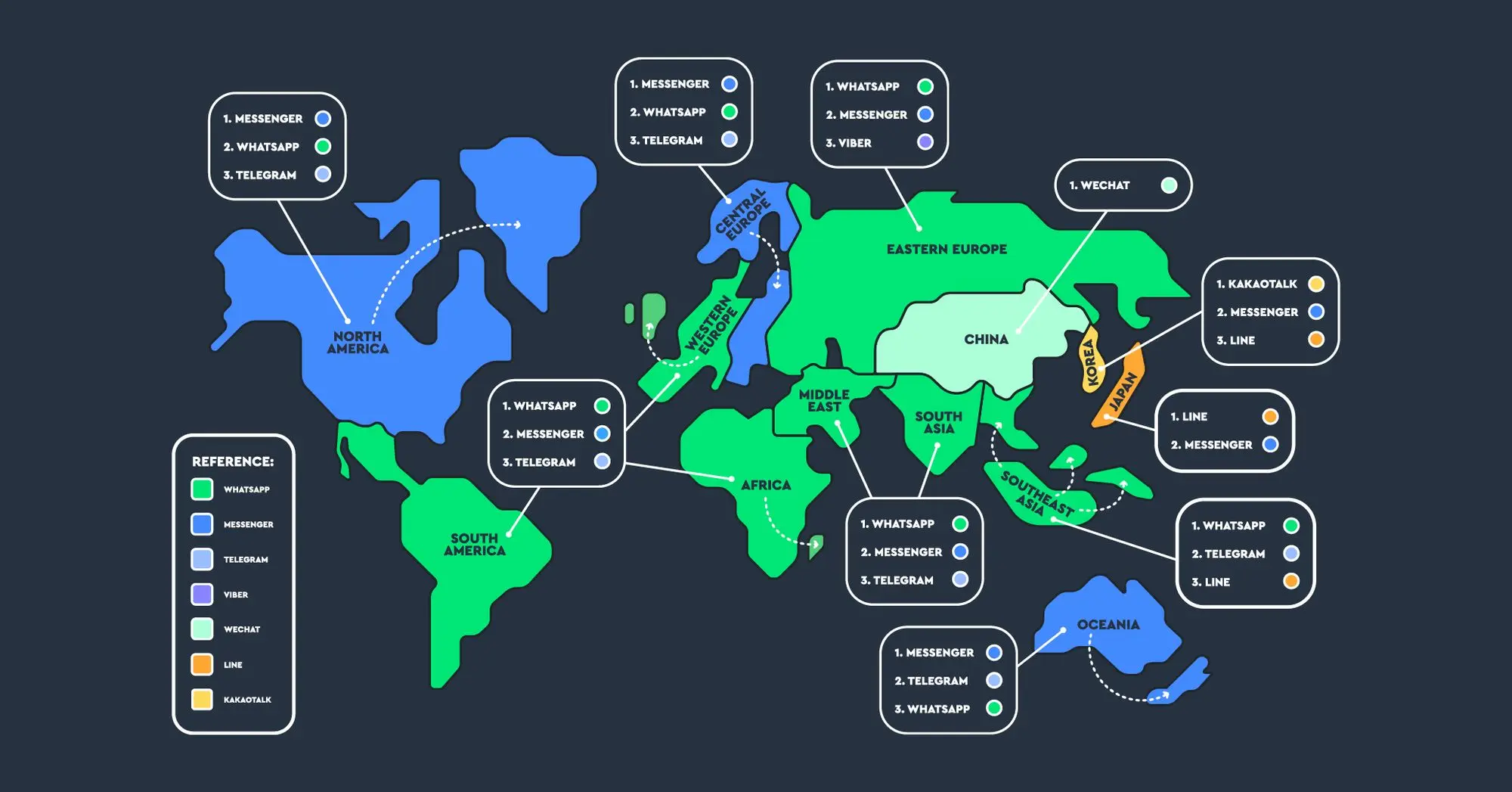
Popular messaging apps allow you to connect with more customers as you can reach users where they already spend a significant amount of time. Mainstream apps like WhatsApp and Facebook Messenger will work most of the time, but niche apps like Telegram, Viber, WeChat, LINE and KakaoTalk have an edge for certain use cases in some regions.
Other than connecting with more customers, there are several other reasons you should use chat apps for business. Let’s take a closer look at them.
Why Use Instant Messaging Apps For Business
Messaging apps make it easier to start a conversation and control conversation tone and speed. Moreover, they help reduce operational costs. This section will explain how messaging apps help you achieve these goals.
It's Easier to Start Conversations On Messaging Apps
Getting customers to chat with your business creates opportunities for you to engage with them, delight them and increase the chances of conversion. On messaging apps, it’s easy to get customers to start chatting with you through QR codes, website widgets and chat links. These methods are much simpler than drafting an email or navigating an interactive voice response (IVR).
Another way to start a conversation is to reach out to customers proactively. Unlike email and phone, some messaging apps do not allow businesses to send the first message. However, messaging apps that let you reach out have a distinct advantage over email and phone.
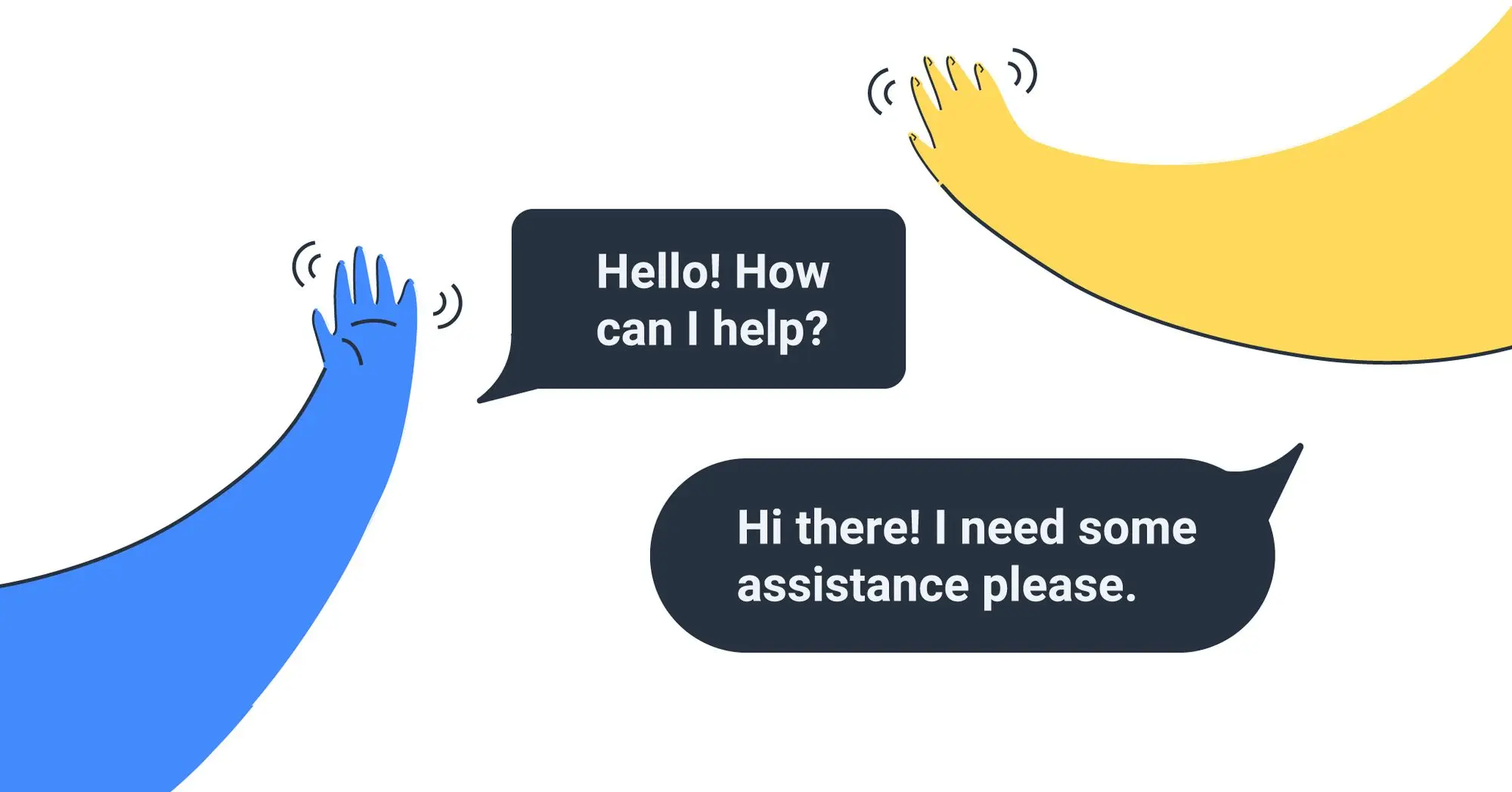
Customers are more likely to respond to your business on messaging apps because they create hard-to-ignore push notifications. As people spend a significant amount of time on messaging apps, they will likely come across your message when accessing the app, even if they initially ignore the notification.
For instance, messaging apps like WhatsApp let you use message templates to initiate customer conversations. They are a real godsend because customers are almost guaranteed to reply.
Conversations on Messaging Apps Are More Effective
With more customers messaging you, it's time to involve your sales and support team. Phone calls have been the gold standard for sales and support because agents can control the tone and speed of a conversation. But messaging apps also offer the same benefits.
Conversations on messaging apps have a casual tone, starkly contrasting with emails, where conversations are formal. Using abbreviations and emojis creates a more approachable atmosphere, transforming an adversarial relationship into a partnership.

Messaging apps also promote faster interactions. With messages flying back and forth on messaging apps, you can solve tickets as fast as you would on web chat. Plus, salespeople can control the emotion levels in conversations, which is impossible over email.
Put simply, you can expect equal or superior sales and support quality on messaging apps compared to traditional channels like phones. Additionally, messaging apps offer a more cost-effective solution when compared to traditional channels. Let's delve into the reasons why.
Using Messaging Apps For Business Is Less Expensive
For businesses, reducing operational costs is just as important as keeping your sales and support team effective. While phone is the only channel that comes close to messaging apps when it comes to sales and support quality, it can be expensive since agents are dedicated to one customer at a time.
As your business expands, you'll need to hire more agents to accommodate the increasing demand, making it a less scalable and cost-efficient option compared to the broader and more flexible capabilities offered by messaging apps. Plus, it can cost a lot to set up and maintain the necessary infrastructure for traditional phone systems.
In contrast, many business messaging apps, like Facebook Messenger, offer free access for businesses to chat with customers. Some apps may have associated costs after an initial free period. Although other apps, like Viber, have fees for initiating conversations, they remain more cost-effective and scalable compared to traditional phone-based systems.
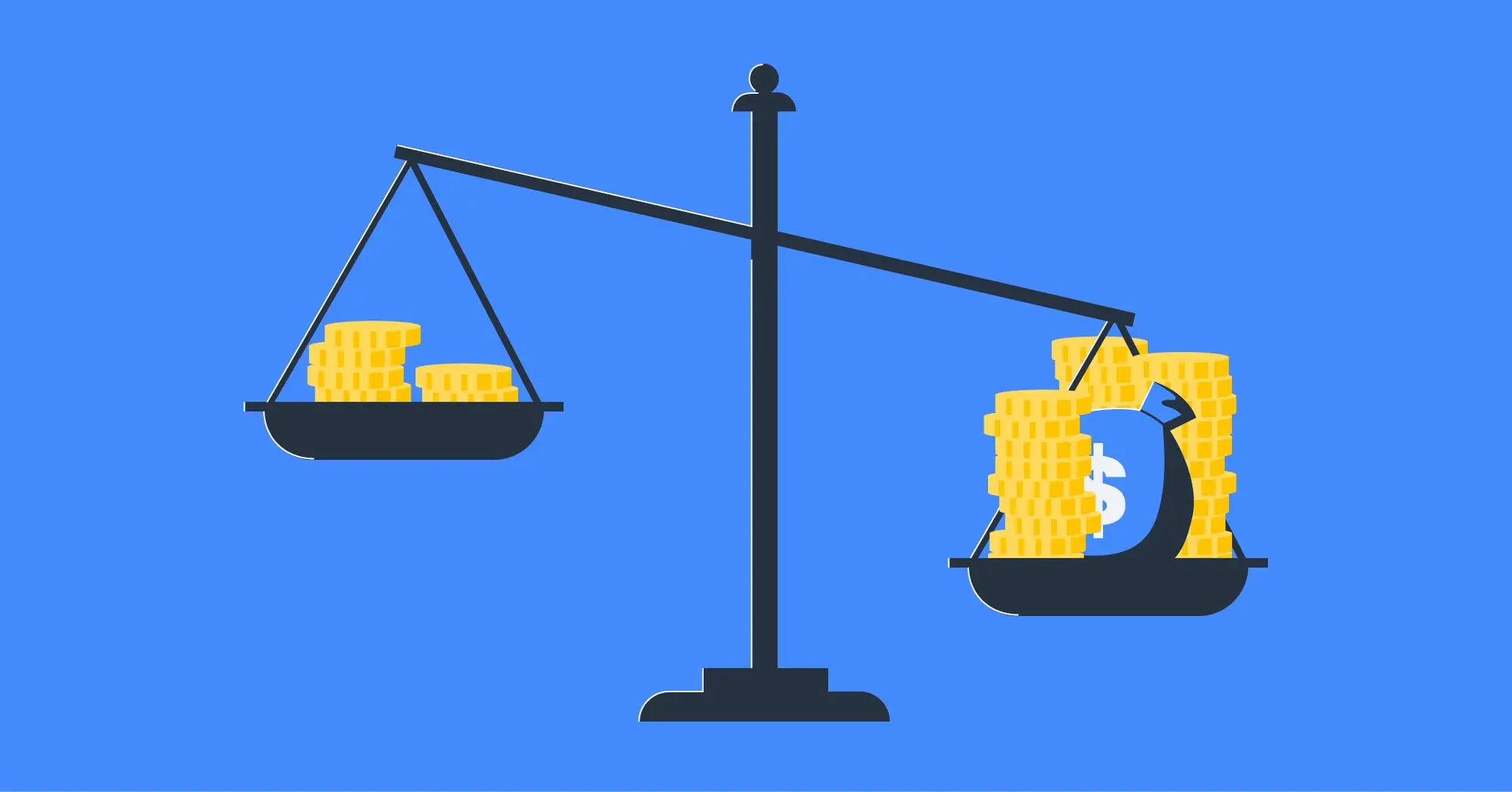
One factor contributing to the cost-effectiveness of messaging apps is that they let you have conversations with more customers without increasing your sales and support team headcount. This is because messaging app conversations don't require both sender and recipient to be present simultaneously.
While handling multiple conversations at the same time is nothing new compared to SMS and email, it is a huge upgrade from phone calls, which require agents to be fully engaged in one conversation.
As you can see, switching to messaging apps is the best decision you can make for your business, as it comes with multiple benefits. You can keep operational costs low while messaging more customers and improving the quality of interactions.
It's important to note that messaging apps operate differently based on each use case. We’ll dive into this topic further below.
Turn customer conversations into business growth with respond.io. ✨
Manage calls, chats and emails in one place!
Best Messaging Apps for Business By Use Case
Messaging apps can benefit any use case. They help capture more leads, reactivate more customers, close more sales, provide more personalized customer support and reduce notification costs. Here, we’ll discuss the best messaging apps for each use case.
Best Messaging App for Business: Marketing
Whether you are a B2B or B2C business, it all starts with attracting leads through marketing. Before we reveal the best messaging apps for marketing, let's find out how messaging apps help you start a conversation with more leads through click-to-chat ads.
Here’s how a typical B2B business advertises: First, you show ads to target buyers. When clicked, the ad will take them to a contact form. If they provide their email address or phone number, you can connect with them via email or phone.
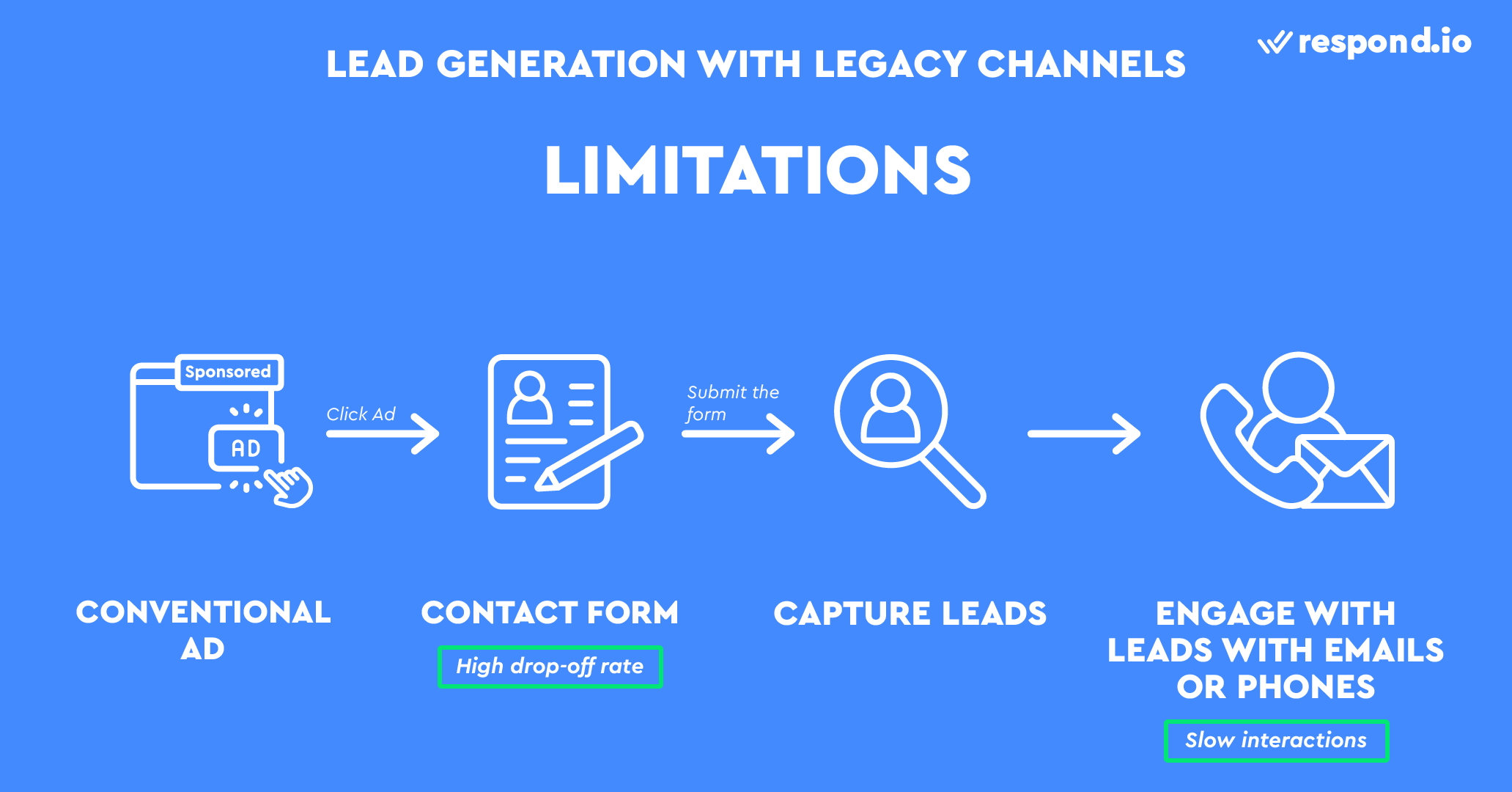
However, customer drop-off is usually high in conventional advertising because many are unmotivated to fill out a long contact form or have privacy concerns.
Messaging apps let you skip the contact form, taking leads right to the conversation with click-to-chat ads. Once leads send the first message, you can message the person back even without their contact details.
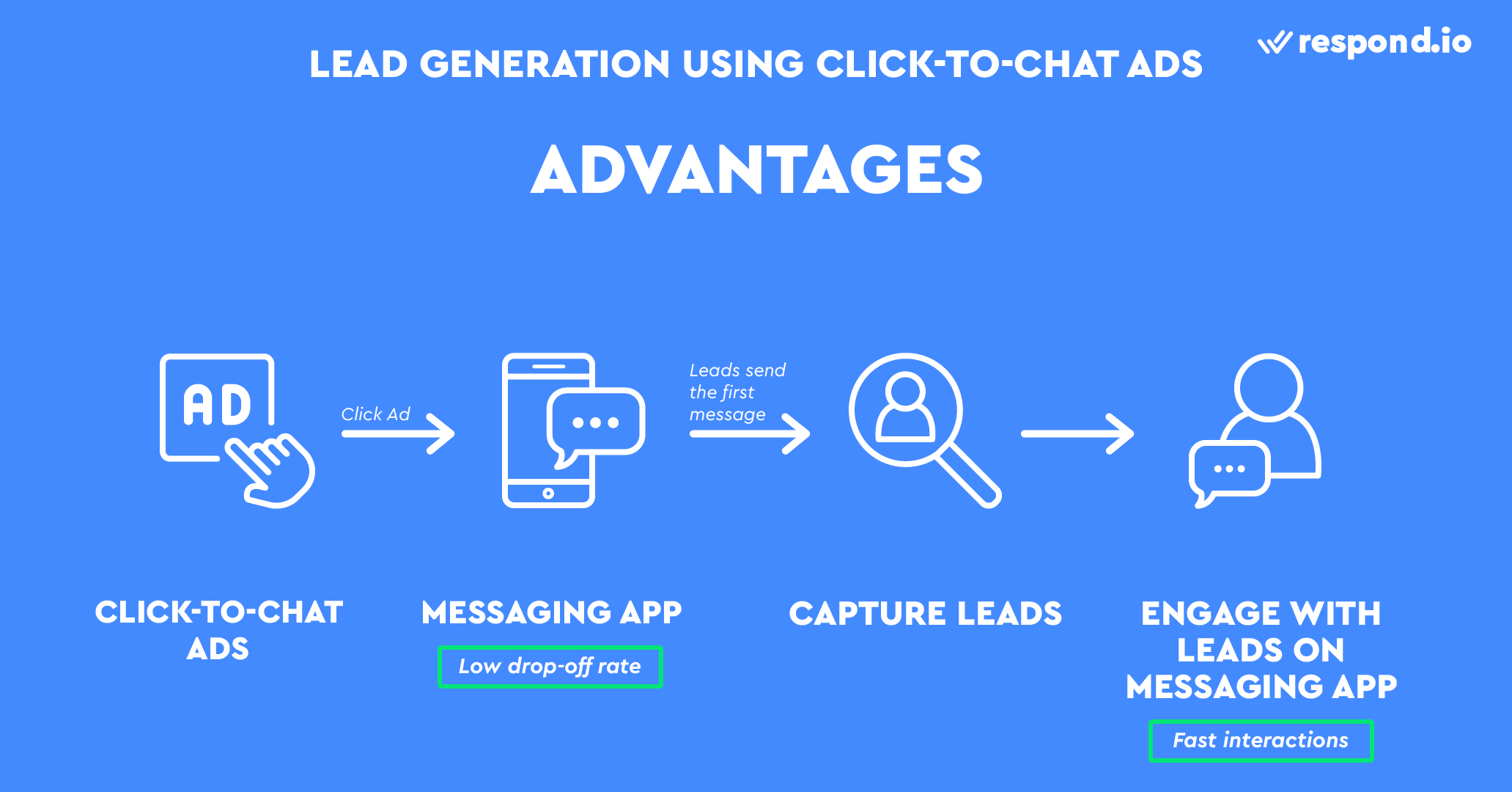
Moreover, messaging app interactions are fast, and you'll get instant replies most of the time. This means you can move leads down the funnel faster on messaging apps compared to emails, where it usually takes days to get a reply.
Messaging apps are clear winners when it comes to marketing, but there's a caveat: you need to have an effective strategy to answer inbound conversations. Therefore, we recommend using messaging apps to promote high-value or complex products where customers usually inquire more before making a purchase.
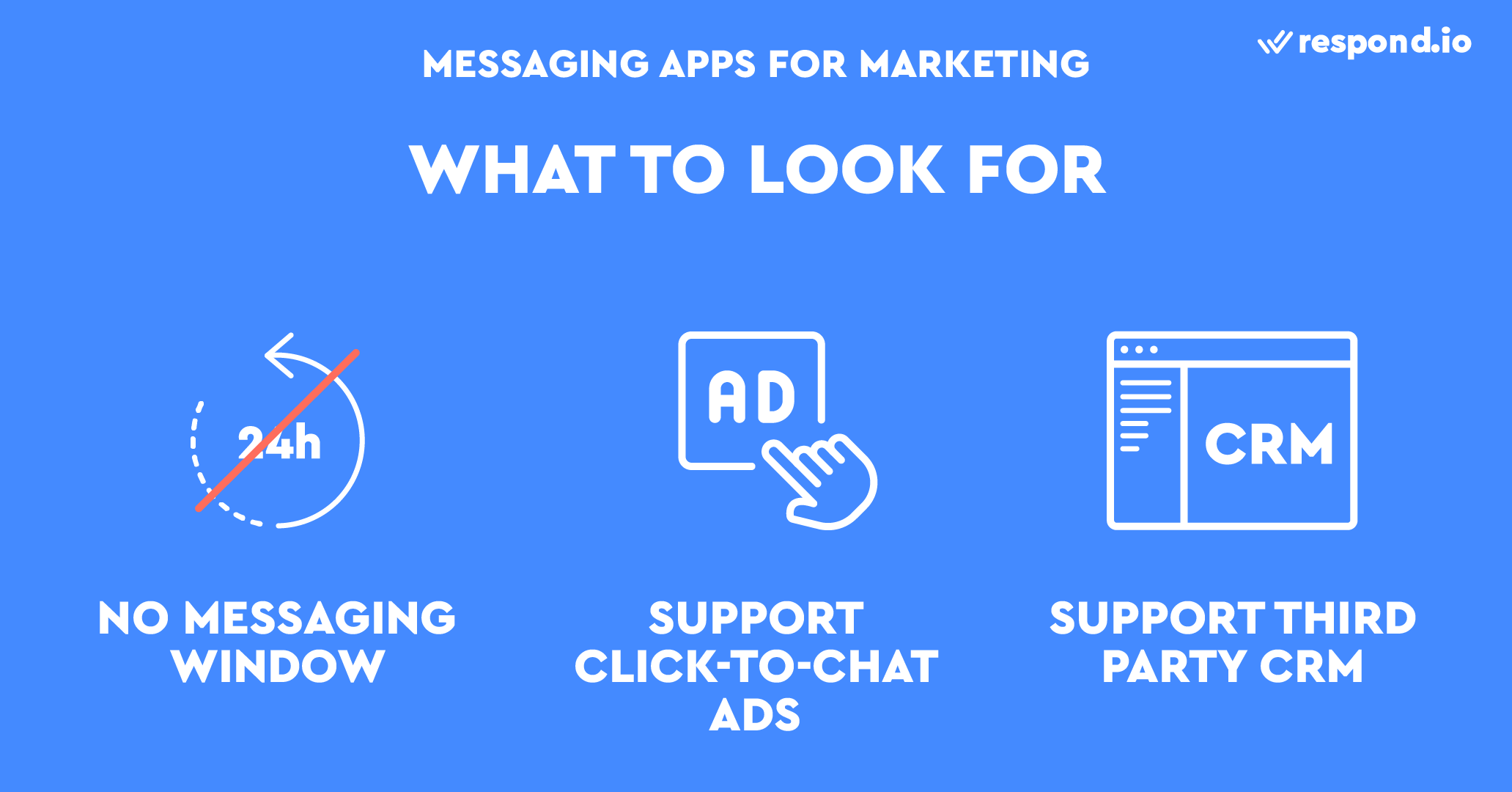
Messaging apps are the best option for marketing because they help capture more leads and move leads down the funnel faster, but which messaging apps should you get? Here are the factors to consider:
Click-to-chat ads: Some messaging apps don't support click-to-chat ads, while others require you to contact the company to place an ad. Ideally, you should get a messaging app that lets you set up ads easily.
Messaging window: Some messaging apps only let you reply to customers within a specific period of time. This restriction is known as a messaging window. Get an app with no messaging window so you can chat with leads anytime and avoid missed opportunities.
Third-party CRM: Not all messaging apps have a built-in messaging inbox for business messaging at scale. Make sure your messaging app can be integrated into an AI-powered customer conversation management software like respond.io or a CRM, which allows you to manage conversations effectively.
In this respect, the best messaging apps for marketing are WhatsApp and Facebook Messenger. You can easily create WhatsApp and Messenger ads without contacting Meta. Plus, both WhatsApp and Messenger can be connected to a third-party software.
Messenger | ||
|---|---|---|
Click-to-chat ads | Available | Available |
Messaging window | Yes | Yes |
3rd party CRM support | Available | Available |
Global popularity | High | High |
While WhatsApp and Facebook Messenger have a Messaging Window, it's not a dealbreaker. By connecting them to respond.io, you can use WhatsApp message templates or Facebook message tags to reopen the messaging window. One thing to consider if you have a tight budget is that message tags are free, while message templates are not.
Messaging apps like WhatsApp and Facebook Messenger can help you attract more leads with click-to-chat ads and push leads down the funnel. But do you know they work equally well for remarketing?
Best Messaging App for Business: Remarketing
Remarketing connects you with people who previously interacted with your business, like those who added items to the cart but did not complete the purchase. If you use emails for remarketing, consider switching to messaging apps because they help you reactivate more customers. We’ll compare remarketing works on both channels to uncover the reasons behind this.
Email remarketing normally works by sending email blasts enclosed with a discount to customers who abandoned their carts in the hope they complete the purchase.
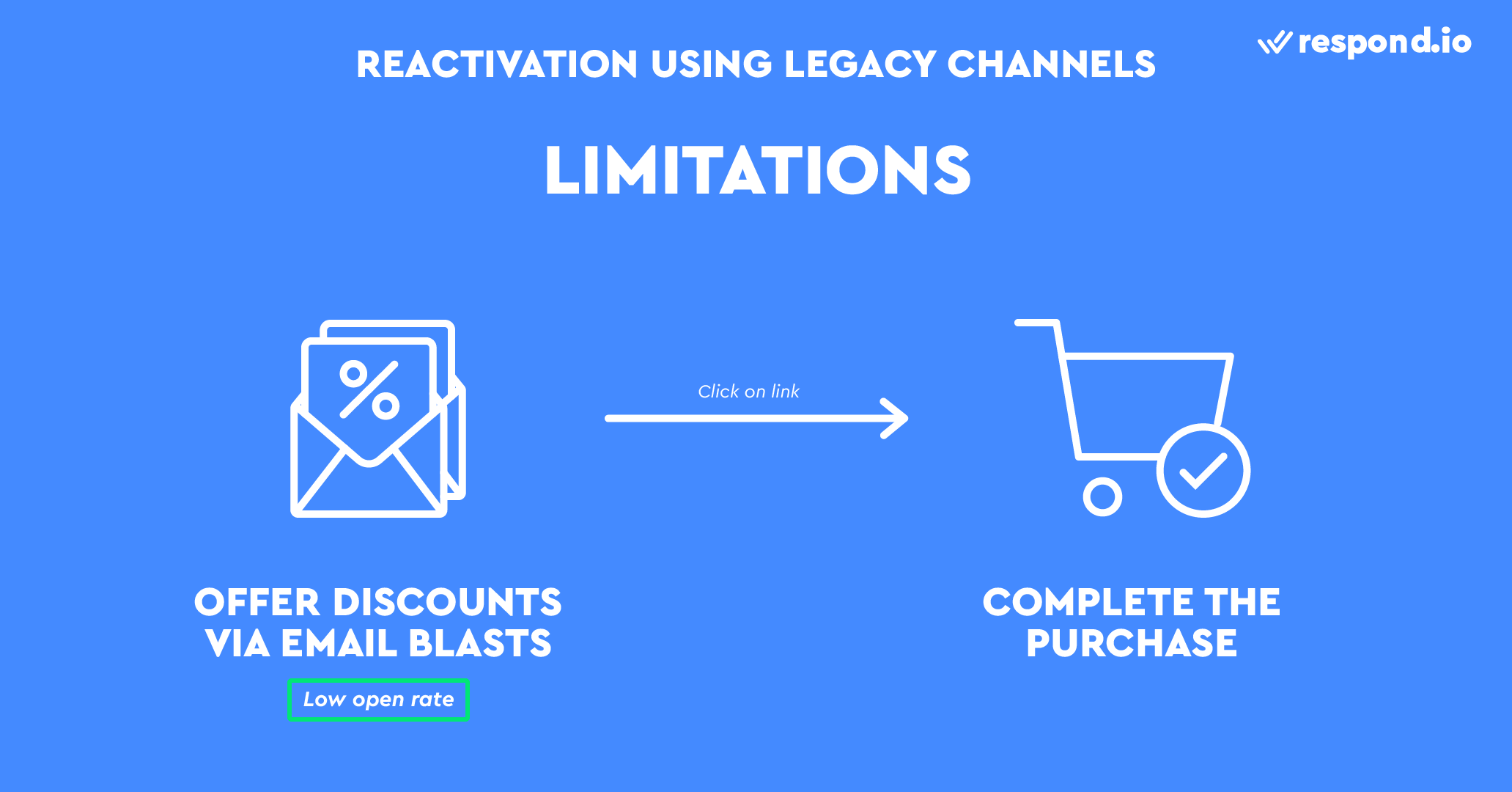
This strategy is good in theory but not in practice, as emails have low open rates because people don't check their inbox all the time. Compared to emails, instant messages are more likely to be read because they trigger push notifications that are hard to ignore.
Messaging apps also help build brand trust by making customer support more accessible to your shoppers. Shoppers can simply reply to a broadcast message to get in touch with your support team.
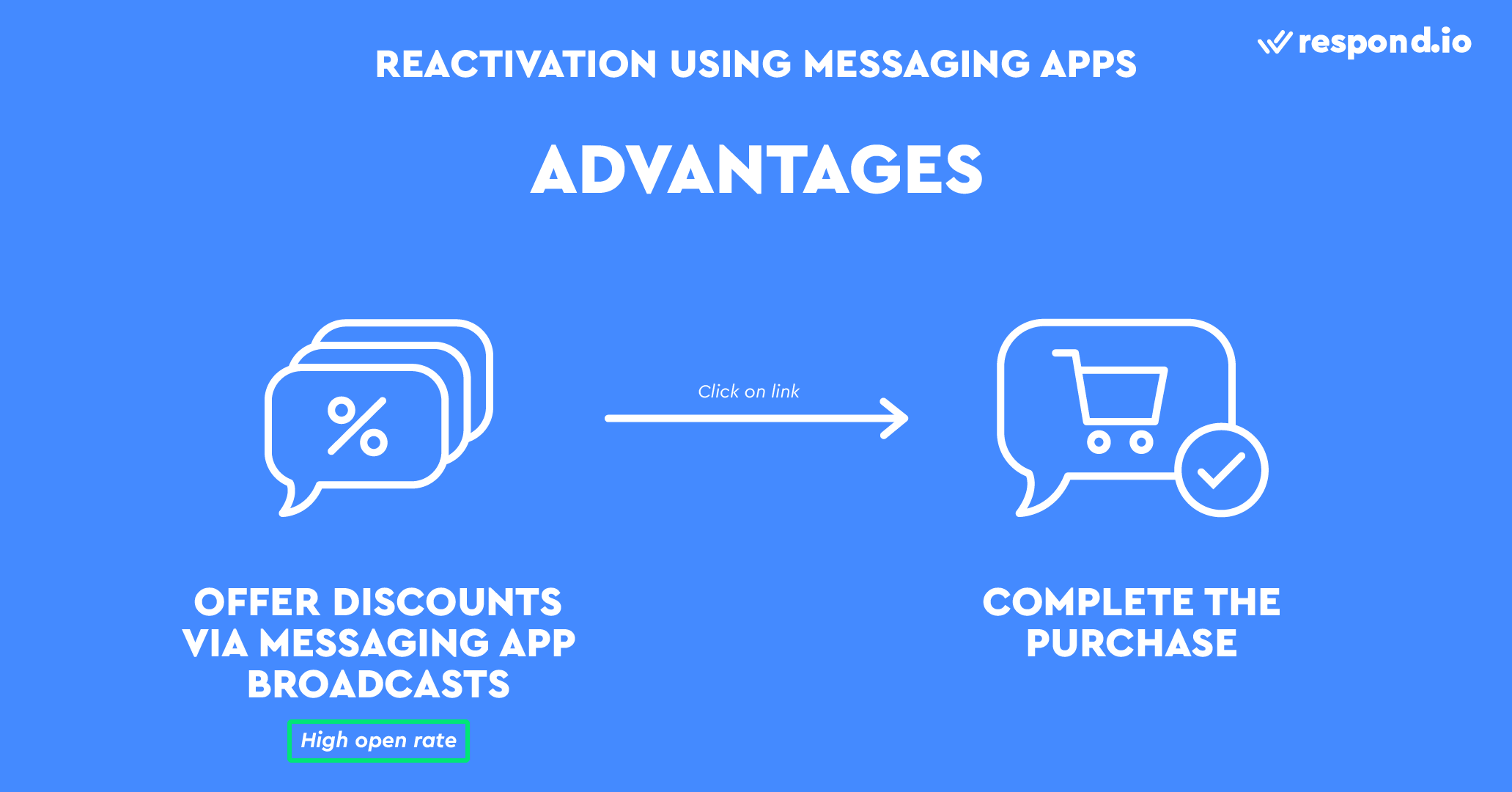
While sending broadcasts over messaging apps is a great way to reactivate a shopper, there are two caveats. You need someone to be there to answer messages, and customers may mark your broadcasts as spam if they haven’t opted in.
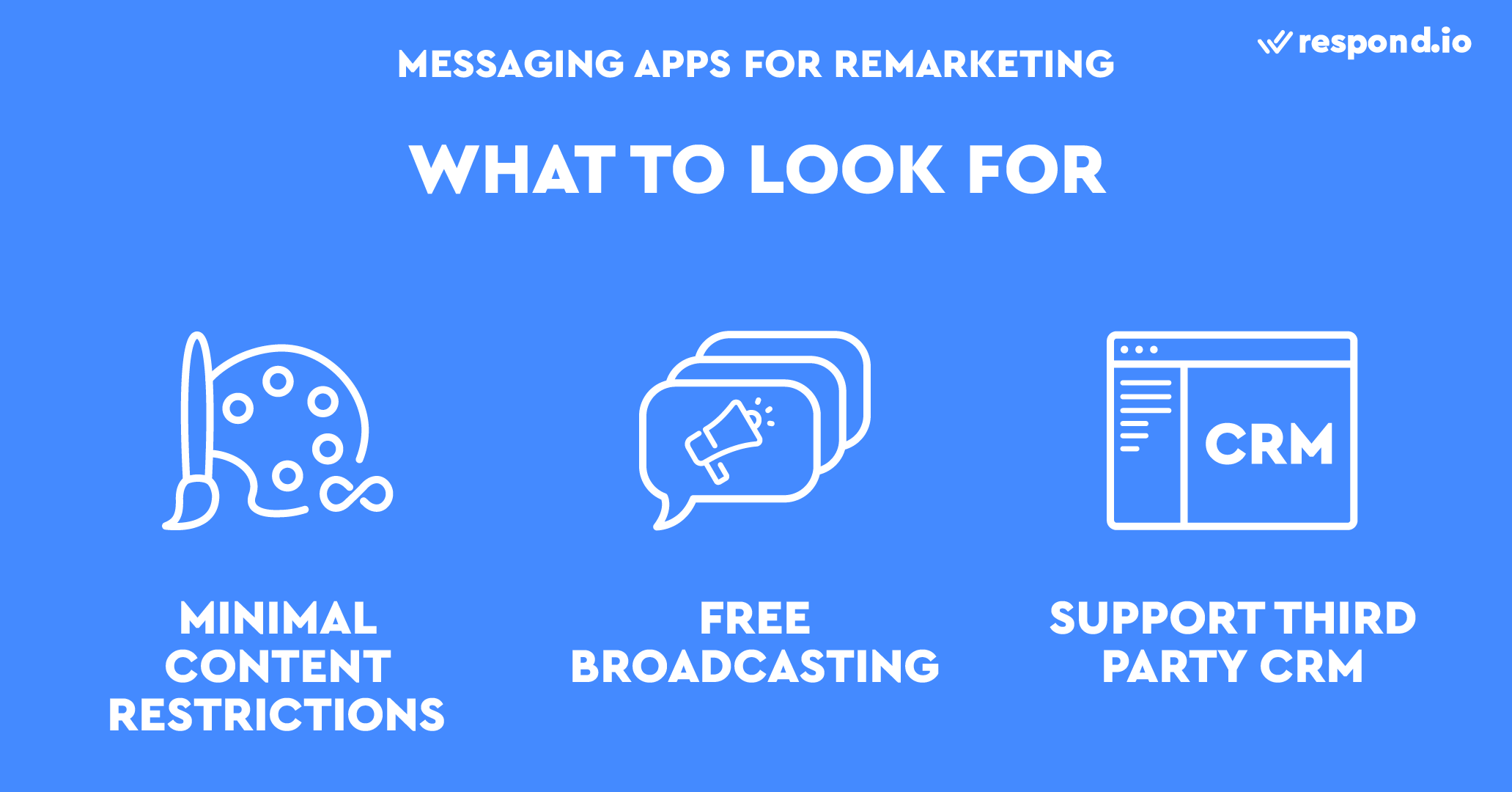
Despite these caveats, messaging apps are your best choice for remarketing because they help you reach more shoppers and build brand trust. But which messaging app should you use? Here's what to look for:
Content restriction: Messaging apps have different rules for sending promotional broadcasts. Find out the rules on what you can and cannot send before committing to a messaging app.
Broadcasting fee: Some messaging apps offer free broadcasting, while others may charge you a fee. Carefully compare the broadcasting fees when selecting a messaging app for remarketing.
Third-party CRM: Choose a CRM or an AI-powered customer conversation management software like respond.io, which offers an easy-to-use broadcasting console, supports targeted broadcasts, measures broadcast results and lets you use AI to handle customer replies from broadcasts.
At first glance, Viber and Telegram seem like the best chat apps for remarketing. Both are free messaging apps with no broadcast content restrictions and they support third-party software integration.
Viber | Telegram | Messenger | ||
|---|---|---|---|---|
Content Restriction | No | No | Yes | Yes |
Broadcasting Fees | Free | Free | Free | Charges apply |
3rd Party CRM Support | Available | Available | Available | Available |
Global Popularity | Limited | Limited | High | High |
However, Viber and Telegram are far less popular than WhatsApp and Messenger. Unless you are targeting niche markets where Viber and Telegram are popular, we recommend using WhatsApp and Messenger for your remarketing campaigns.
WhatsApp and Messenger may have content restrictions for broadcasts, but they aren’t dealbreakers. WhatsApp allows promotional message templates, and you can always send promotional broadcasts with sponsored messages on Facebook Messenger.
We've seen how messaging apps transform the remarketing process, helping you reactivate more customers and build brand trust. But do you know they work equally well for sales?
Best Messaging App for Business: Sales
After laying the groundwork with marketing, it's time to close the deal. In this section, we’ll show you how you can close more sales by integrating messaging apps into your workflow.
Every sale starts with a lead, and it hinges on how fast you can respond. You need to be there to pick up phone calls or answer web chat messages. As for contact forms, you want to email the prospects back before you lose them.
With messaging apps, salespeople don't need to be available that very second because prospects can't leave the conversation. Plus, notifications will get them back into the conversation as soon as the salesperson responds.
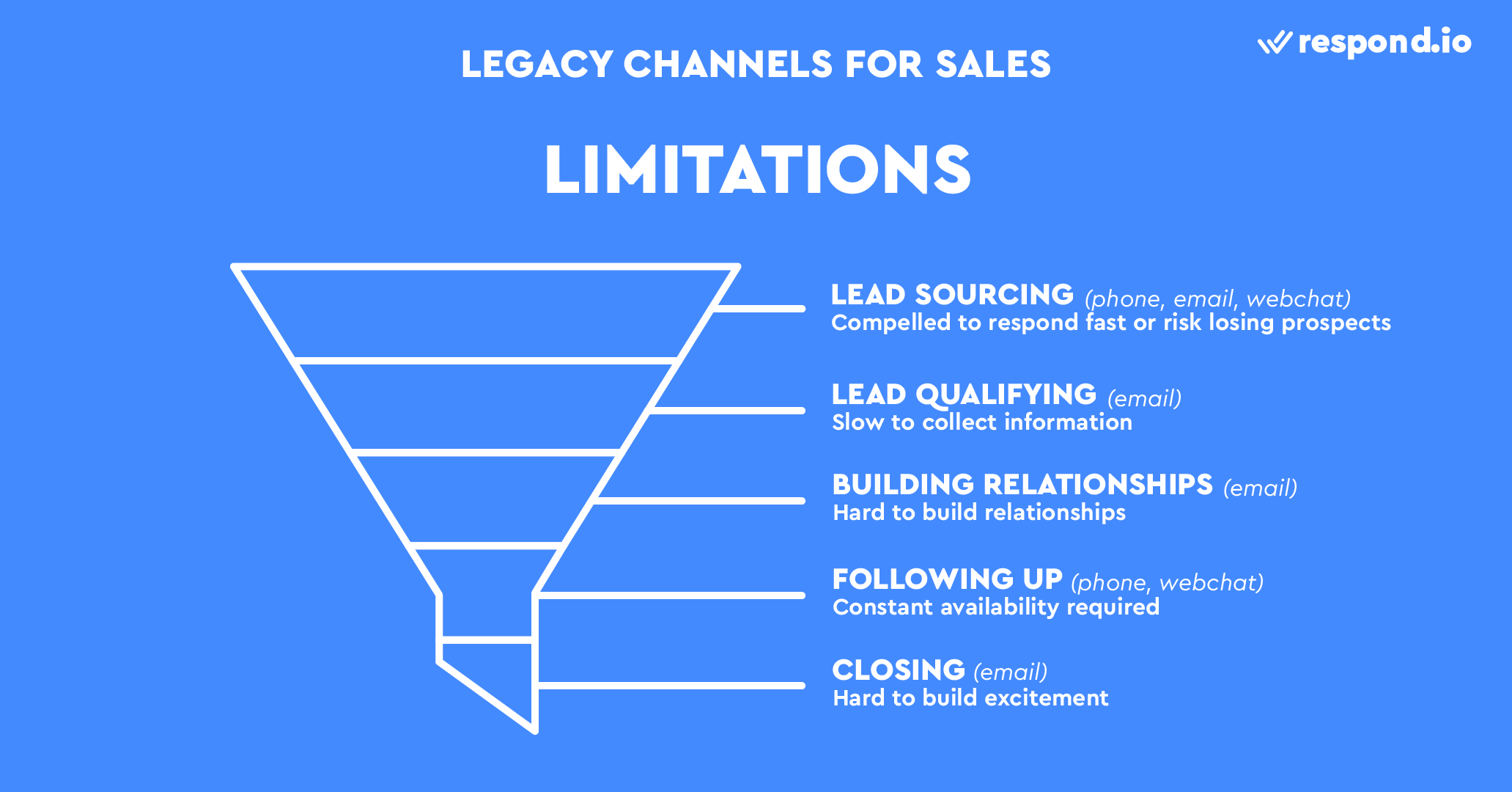
Messaging apps make qualifying easier too. Fast interactions on messaging apps let sales reps gather lead information faster and decide sooner if the lead matches their buyer profile. In contrast, qualifying leads using email can be slow as it involves a lot of back-and-forths.
Once leads are qualified, the next step is to build rapport with them. Building rapport through emails is challenging because they often sound cold. Fortunately, it's easier to build a partner-like relationship over messaging apps as the interactions are more casual by comparison.
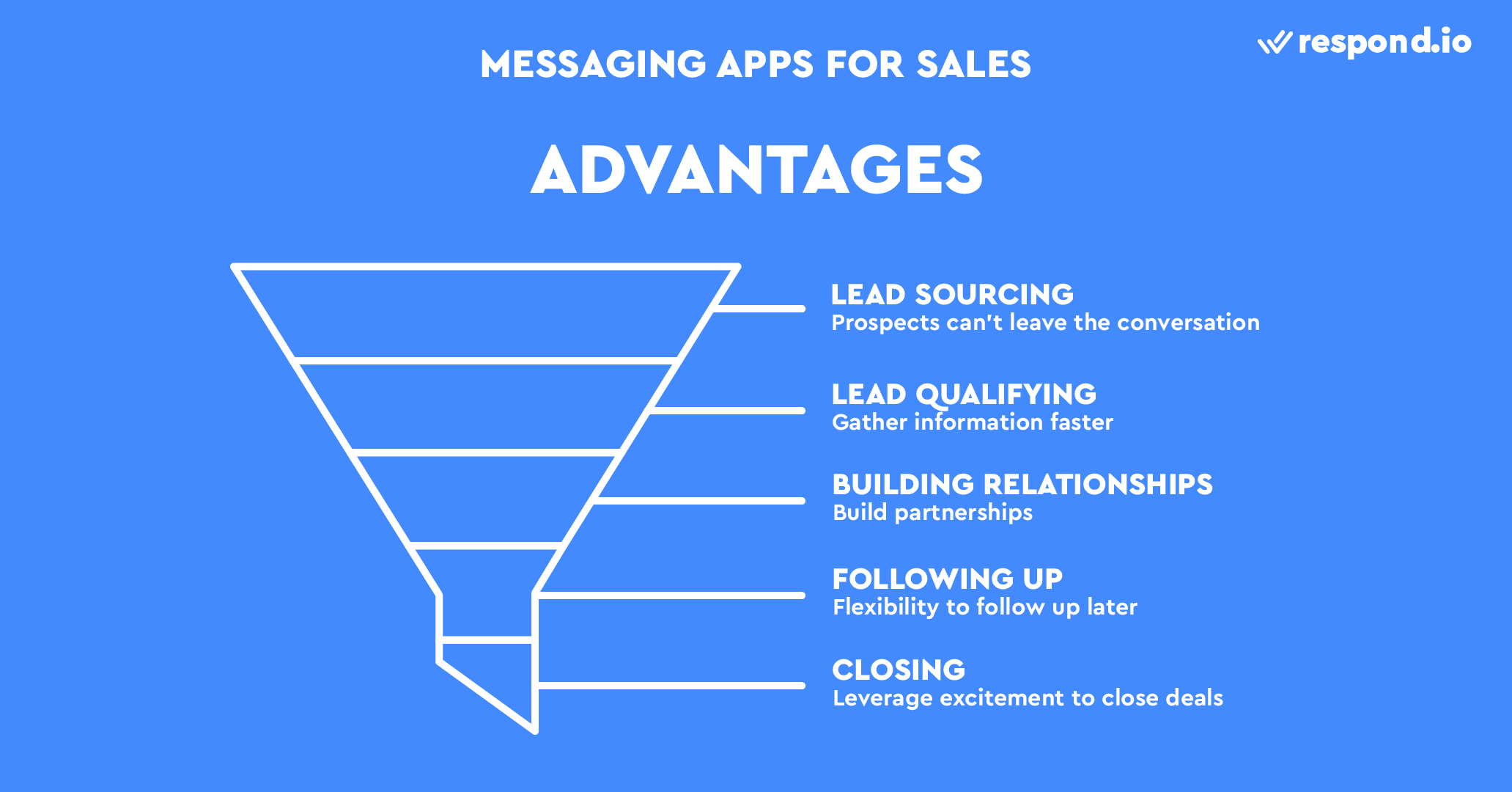
Building a relationship with leads is half the battle, but to convert leads on traditional channels, salespeople need to be constantly available to take calls or reply to web chats. On messaging apps, sales reps can follow up later without fearing they can’t restart the conversation.
Leveraging the power of emotions when closing deals is important. However, driving enthusiasm with email is challenging due to its inherent formality. On the contrary, messaging apps enable salespeople to use the cadence of conversation, emojis and gifs to build excitement before closing the deal.

There are many reasons to use messaging apps for sales. Messaging apps make things easier for sales reps and empower them to succeed. Remember, not all messaging apps are created equal - here are the things to look for:
Messaging Window: Go for a messaging app without a messaging window so that you can follow up with prospects anytime you like.
Third-Party CRM: Get a messaging app that can be connected to a third-party business software. Respond.io has features like multi-user functionality, which improves the productivity of your sales team and AI tools to manage lead conversations automatically and help agents reply to customers more effectively.
So, what are the best messaging apps for sales? The best messaging apps for sales are LINE and Viber because they have no messaging window and can be integrated into a third-party software.
That said, you should always consider whether your customers actually use LINE and Viber. Being niche messaging apps, LINE and Viber are only popular in select regions like Japan and Eastern Europe.
Viber | LINE | Messenger | ||
|---|---|---|---|---|
Messaging Window | No | No | Yes | Yes |
3rd Party CRM Support | Available | Available | Available | Available |
Global Popularity | Limited | Limited | High | High |
Outside these regions, your safest bet is to use a mainstream messaging app like Facebook Messenger or WhatsApp. We recommend connecting these apps to respond.io so you can message them again to follow up even after the messaging window has closed.
We’ve shown you how messaging apps can empower your sales team to be more productive. Now, let’s find out how messaging apps fit into your support process.
Best Messaging App for Business: Customer Support
After-sales support plays an important role in customer satisfaction and helps cultivate customer loyalty. By adopting messaging apps to your support workflow, you can resolve issues faster and have more satisfied customers.
The support process starts with a customer finding a way to contact you. Messaging apps make it simple for customers to reach you. On certain apps, they can search for your business in-app and start a chat right away. You’ll save customers the hassle of finding an email address or phone number buried in the Contact Us webpage.
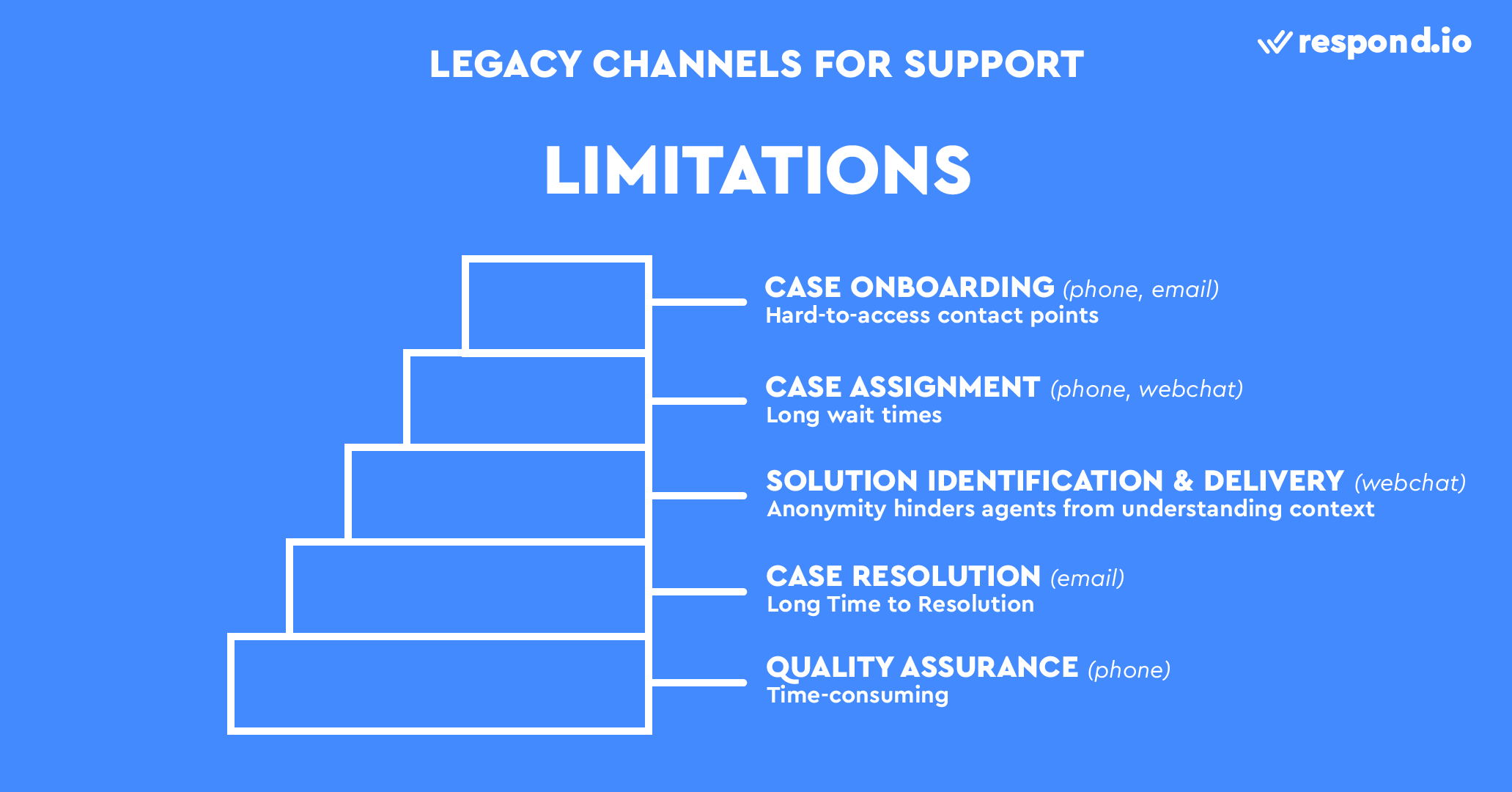
Once they start a chat, customers can continue the conversation immediately without having to wait in a queue because agents can handle several conversations simultaneously. With phone and web chat, customers have to wait for an agent to become available.
To provide effective solutions to customer problems, agents must understand customer context through past conversations or behaviors. But this is easier said than done, especially on web chat, where visitors are usually anonymous. Thankfully, most messaging apps give you a name or phone number, allowing you to identify the person, gain context from past interactions and personalize the solution.
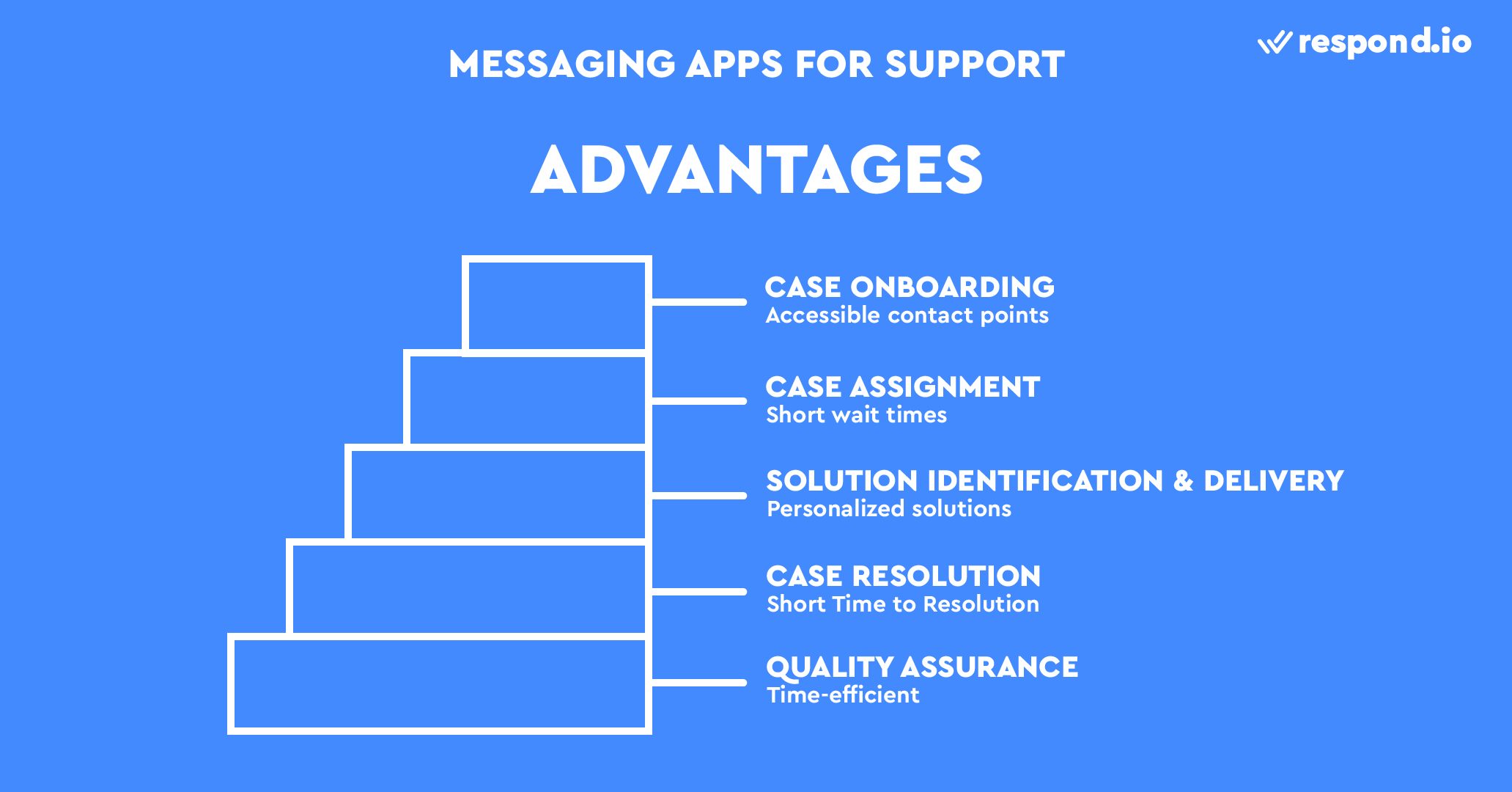
Keeping resolution time low is just as important as offering a quality solution. Messaging apps reduce the resolution time thanks to their fast-paced interactions. Email interactions are slower by comparison, so it takes a longer time to resolve a case.
Support doesn't end with a case resolution. Managers need to review the conversation for quality assurance, like listening to the entire phone call recording. With messaging apps, managers can just glance over the text conversation to look for red flags.
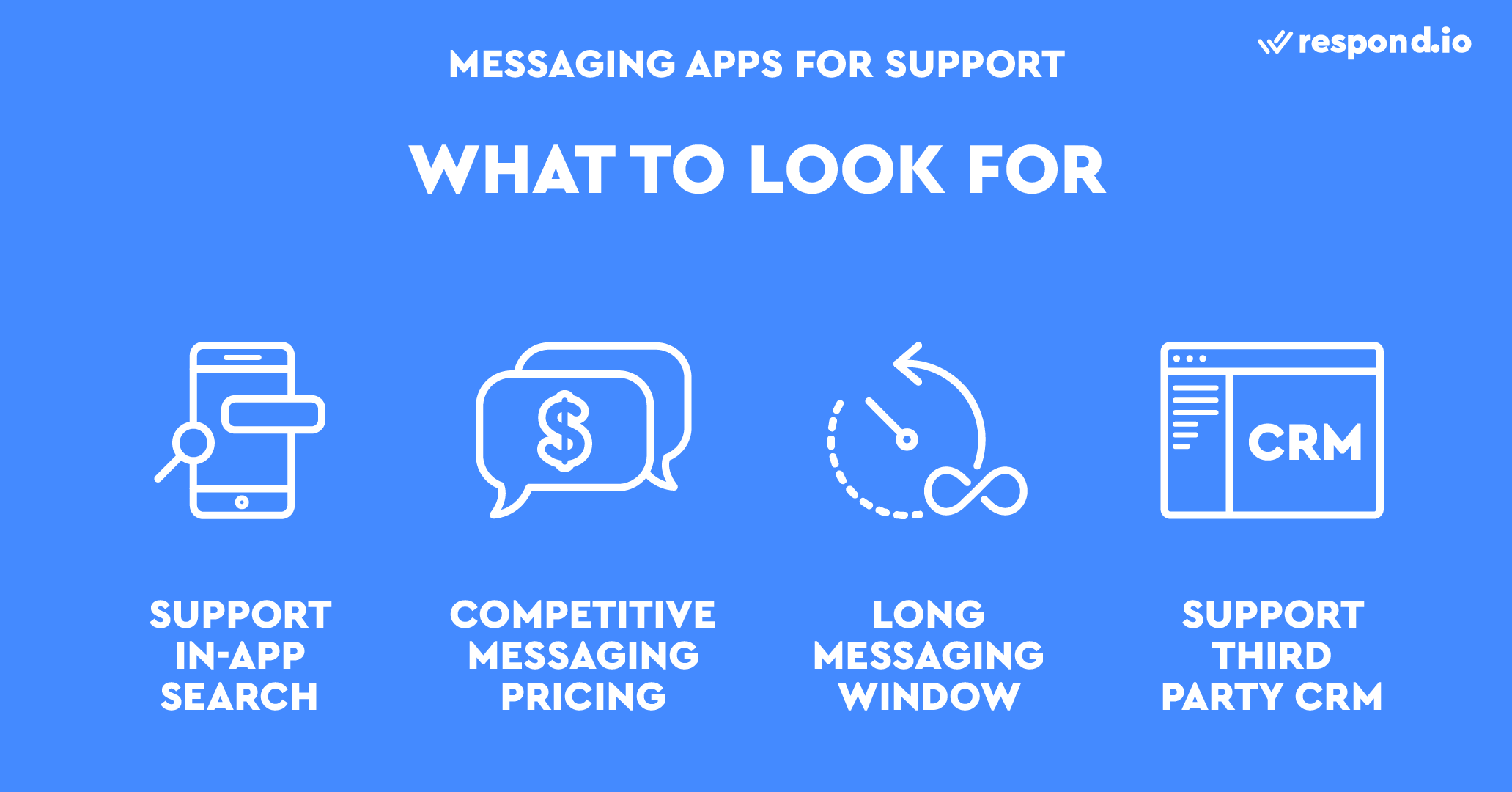
In summary, messaging apps make it easier for customers to find you, reduce wait times, enable personalized solutions, reduce resolution time and allow for speedy managerial reviews. It's clear why you should use messaging apps for support, but which one suits your company best? Here are the factors to consider:
In-app searches: To make customer support more accessible, choose a messaging app that lets customers search your business in-app.
Messaging fees: The messaging fees can add up if your support team deals with a large number of cases every day. You should carefully compare messaging prices across different apps.
Messaging window: Sometimes, it takes days to resolve a complex case. So, you should get a messaging app with no messaging window or at least one with a reasonably long messaging window. Respond.io is one of the few customer conversation management software that offers an extended Messaging Window of 7 days on Messenger.
Third-Party CRM: Similar to the sales use case, select a third-party software that supports multiuser functionality, offers AI tools to manage lead conversations automatically, reply to customers more effectively and more.
The best messaging apps for customer support that check all the boxes are Facebook Messenger, Telegram and WeChat. They support in-app searches, offer free messaging, have no messaging window or have an extended one, and they can be integrated into a CRM or third-party software.
Telegram | Messenger | |||
|---|---|---|---|---|
In-app Searches | Available | Available | Available | Available |
Messaging Fess | Free | Free | Free | Charges apply |
Messaging Window | No | Yes | Yes | Yes |
3rd Party CRM Support | Available | Available | Available | Available |
Global Popularity | Limited | Limited | High | High |
Keep in mind that Telegram and WeChat are only popular in niche markets such as Eastern Europe and China. In other regions, globally popular messaging apps like Facebook Messenger and WhatsApp can fulfill almost all the criteria we discussed above.
If you connect WhatsApp or Facebook Messenger to respond.io, you can message customers outside the messaging window. Remember, messaging outside the messaging window will incur extra costs on WhatsApp, but it’s free on Facebook Messenger.
Messaging apps like WhatsApp and Facebook Messenger improve support quality, reduce operational costs and more. Next, we’ll explore how messaging apps enhance the transactional notifications process.
Best Messaging App for Business: Transactional Notifications
Notifications have diverse uses in business, from notifying customers of shipment updates to announcing scheduled maintenance. Before we go over the best messaging apps for transactional notifications, let's review how they work.
An enterprise resource planning (ERP) system is a central database that lies at the heart of every notification workflow. It detects all new events that occur on your website, like new orders.
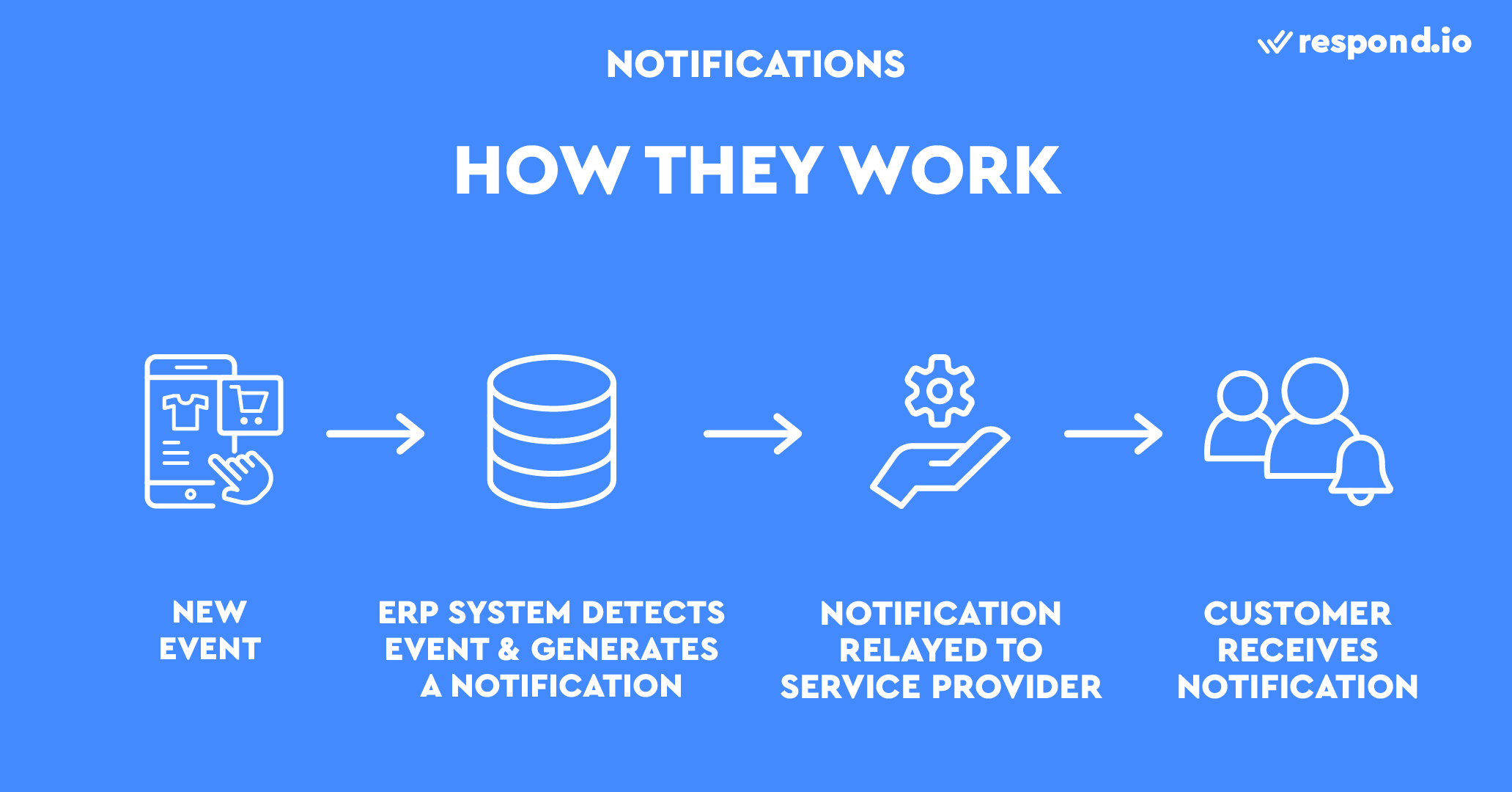
Once the ERP system detects an event, it will generate a notification using a template and personalize it with customer information. With order confirmations, for instance, the notification will include the customer's name and order number.
The notification will then be relayed to your channel provider, such as an SMS provider, and ultimately, your customer. While you may be accustomed to using SMS or emails for Notifications, messaging apps are a better option because they are more affordable than SMS and have a higher open rate than email.
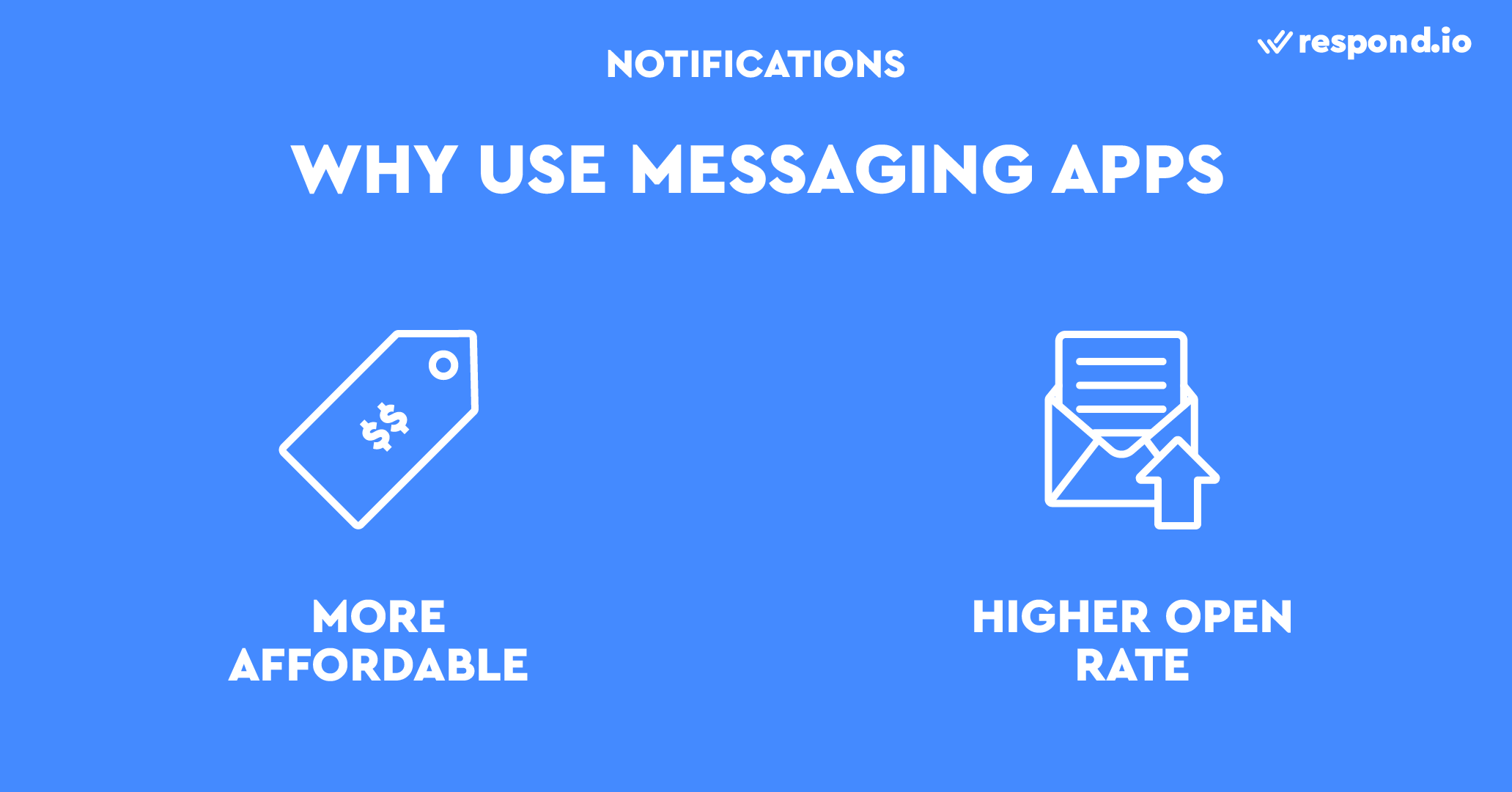
Messaging apps can reduce operational costs because many of them let you send notifications for free. By contrast, SMS providers charge a per-message fee, which can add up if you send many notifications.
Plus, messaging apps have a higher open rate because people are constantly on messaging apps. Even if people miss the notification, they’ll see it when they go into the app. By contrast, email notifications often go unread because we don't check our inbox as often, and many of us turn off push notifications for emails.
Clearly, messaging apps are a great way to send notifications. However, try not to bombard customers with too many notifications, as it can lead to them blocking you. And it’s good practice to ask your customers which app they prefer to receive notifications on.
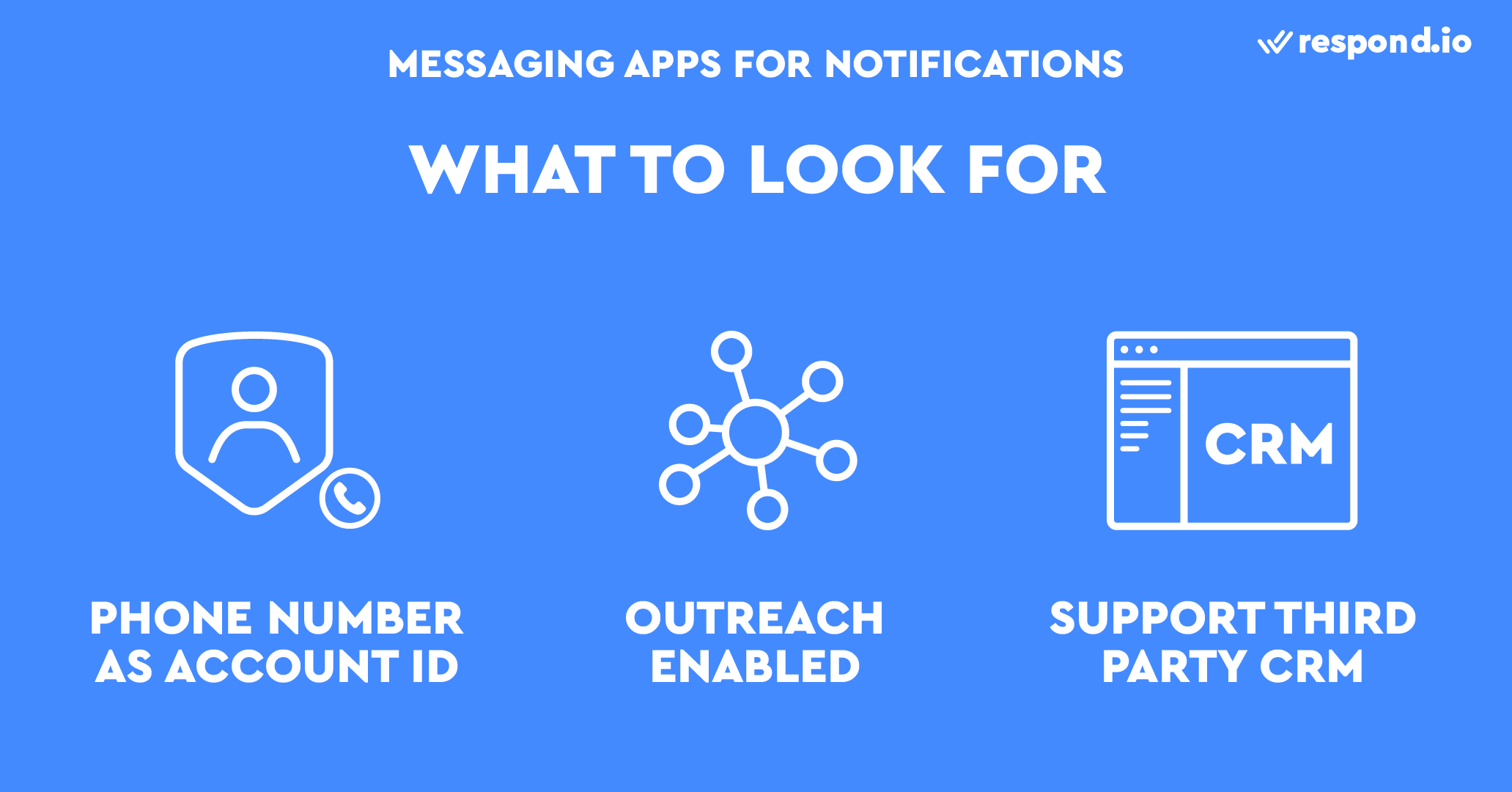
Other than customer preference, here are the things you should consider when choosing a messaging app for Notifications:
Personal account ID: In cases where security is important, such as sending an OTP, you may prefer sending notifications with a messaging app that uses a phone number as the Personal account ID.
Outreach capability: Ideally, you should choose a messaging app that allows sending the first message. Otherwise, you’ll have to request your customers to message you first.
Third-party CRM: Go for a messaging app that supports third-party software integration. Respond.io enables you to send notifications on multiple messaging channels while providing flexible integrations with ERP systems. Remember, the software of your choice needs to be used in conjunction with your ERP system to send targeted notifications.
The best chat app that ticks all the boxes is WhatsApp. It uses phone numbers as the Personal account ID and can be integrated into a CRM or customer conversation management software. Plus, WhatsApp allows sending the first message to customers who have opted in to receive notifications.
Personal Account ID | Outreach Capability | 3rd Party CRM Support | Global Popularity |
|---|---|---|---|
Phone number | Limited | Available | High |
Remember, WhatsApp only allows sending the first message with message templates. To start sending message templates, get a WhatsApp API account from respond.io and start messaging customers on the world's most popular messaging App!
Turn customer conversations into business growth with respond.io. ✨
Manage calls, chats and emails in one place!
Further Reading
If you’re interested in exploring more about business messaging, check out these articles:


























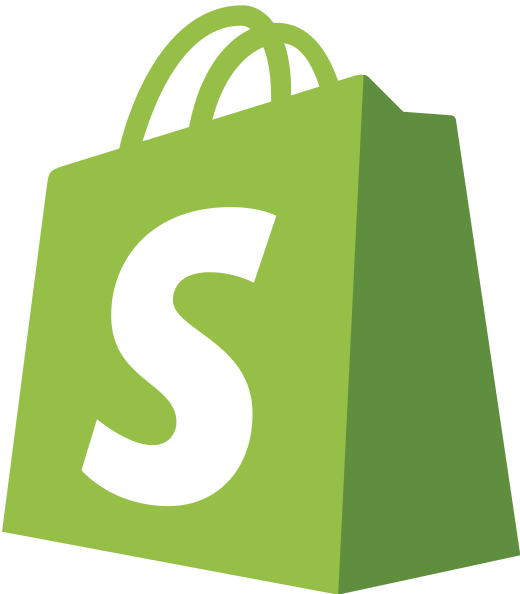











 Electronics
Electronics Fashion & Apparel
Fashion & Apparel Furniture
Furniture Jewelry and Watches
Jewelry and Watches
 Afterschool Activities
Afterschool Activities Sport & Fitness
Sport & Fitness
 Beauty Center
Beauty Center Dental Clinic
Dental Clinic Medical Clinic
Medical Clinic
 Home Cleaning & Maid Services
Home Cleaning & Maid Services Photography & Videography
Photography & Videography
 Car Dealership
Car Dealership
 Travel Agency & Tour Operator
Travel Agency & Tour Operator




